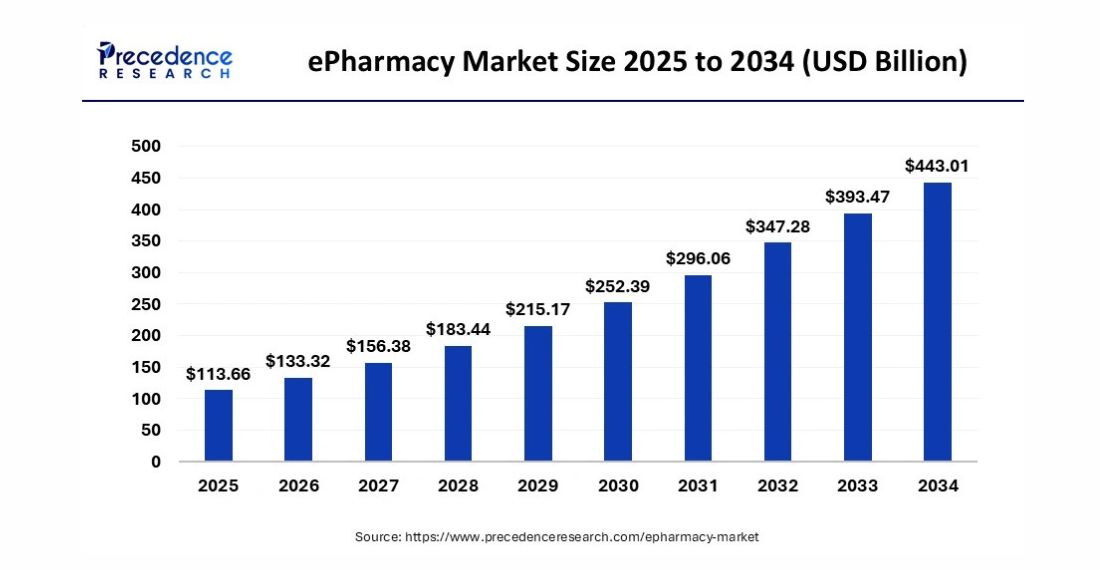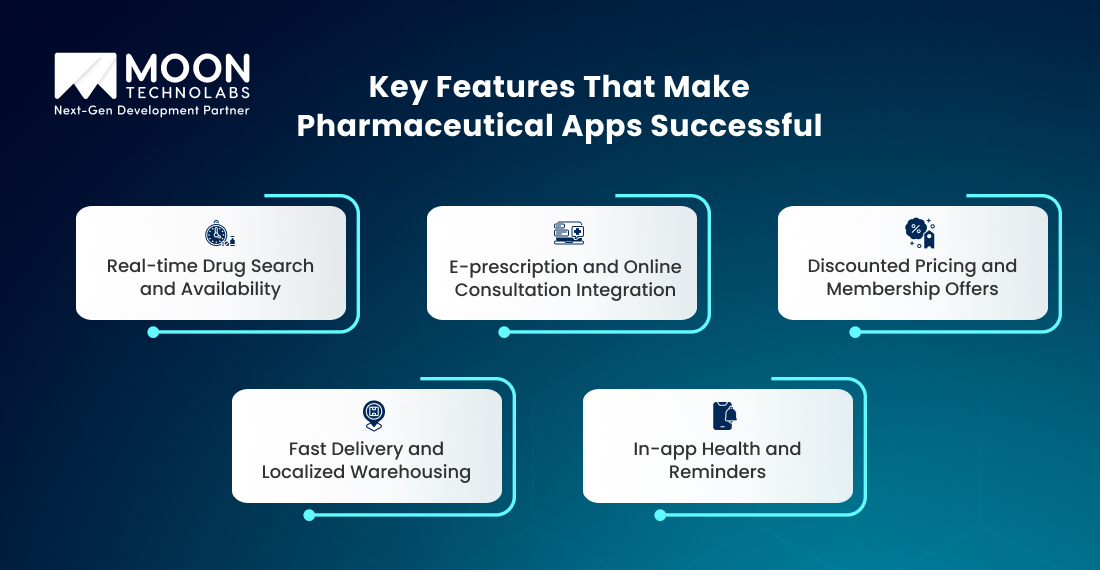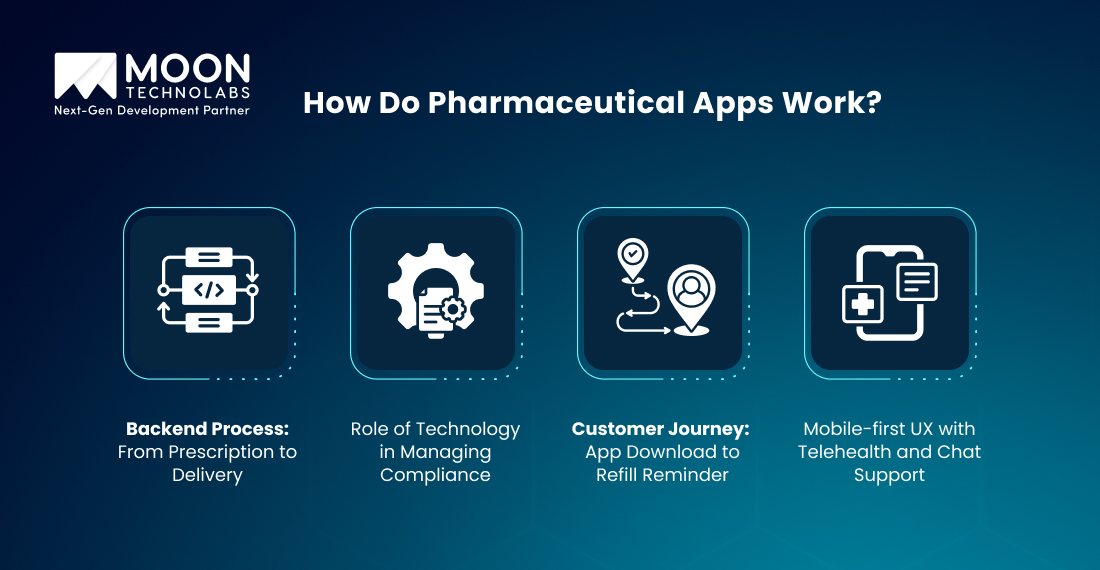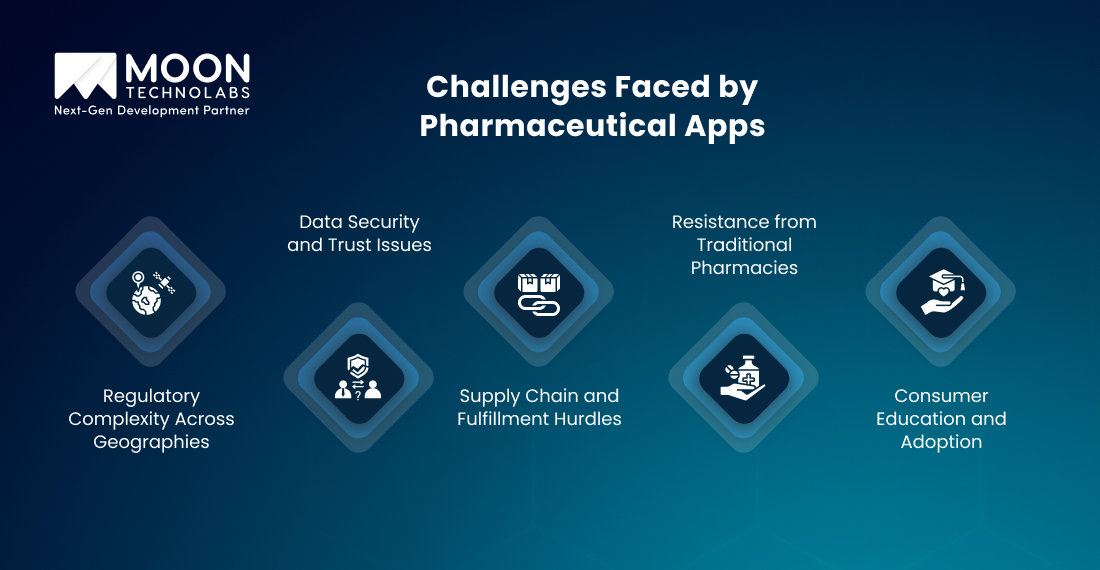Table of Content
Blog Summary:
This blog provides adequate information regarding the pharmaceutical app business model and its importance in today’s fast-growing digital era. We discuss everything about pharmaceutical apps, including their history, rise, important features, functions, revenue model, and challenges. Explore the entire post now.
Table of Content
Many industries are undergoing digital transformation lately, and the pharmaceutical industry is one of those.
According to stats by Precedence Research, the global ePharmacy market was valued at $96.89 billion in 2024 and is likely to reach $443.01 billion by 2034 at a CAGR of 16.4%. Many factors, including mobile apps, are driving the pharmaceutical industry’s digital transformation.

Pharmaceutical apps have recently revolutionized the way patients and healthcare service providers interact, from teleconsultation to personalized medication tracking. The growing use of apps in this sector has caused entrepreneurs to adopt the pharmaceutical app business model.
So, whether you are a business owner, strategist, or medical professional, understanding these business models in detail is essential. In this post, we will help you understand this business model in depth.
Pharmaceutical apps are software solutions that cater to the specific needs of medical professionals. They help them manage healthcare requirements with smartphones and include a range of features, such as e-prescriptions, health tracking, and more.
The demand for pharmaceutical apps is growing by leaps and bounds. The growth of digital health platforms during the COVID-19 pandemic, fostering the tradition of remote healthcare services and medicine delivery, has also contributed to this.
Customers today desire smooth access to healthcare from the comfort of their homes. This has caused a huge adoption of pharmaceutical apps worldwide, and due to affordability, convenience, and accessibility, pharmaceutical apps worldwide are expected to grow tremendously in the coming years.
Many leading healthcare service providers have earned a huge customer base by providing integrated services. With the advancement of technology, pharmaceutical apps have vast potential to play a leading role in modern healthcare delivery.
Pharmaceutical apps started to rise in the 2010s to deal with various healthcare-related challenges. These include high medication costs, limited access to pharmacies, inconvenient prescription refills, and more. Earlier, healthcare apps were responsible for tackling price comparison, medication delivery, remote consultation, and more.
With technological advancements, apps have become more efficient and smart, especially with the integration of technologies like AI and others. AI-driven apps include numerous features like pill reminders, automated prescription analysis, real-time inventory tracking, and more.
Its major growth includes acquisition by health tech market players, major funding rounds, and support from regulators who are aware of the healthcare potential to minimize system strain. AI-based apps are appropriate for personalized medicine plans, indicating drug interactions, ensuring on-time compliance, and more.
The platform expanded later by partnering with clinics and local pharmacies, providing an end-to-end virtual experience, integrating telemedicine, and more.
Today, pharmaceutical apps have emerged as much more than just digital pill dispensers. They have become an important part of the connected healthcare ecosystem and bridge the gap between healthcare providers, patients, and pharmacists.
From prescriptions to predictions—a pharmaceutical app model that redefines patient care. 🧬📱

Features are crucial factors in making any pharmaceutical app unique and thus ensuring its success. We have covered some of the best pharmacy app features in detail:
One of the major features of a pharmaceutical app is that it lets users search for medicines quickly and hassle-free. They can also easily check the availability of medicines.
This prevents customers from wasting their valuable time when they place orders for items that are not in stock. It offers a great shopping experience with huge trust.
The integration of e-prescription and online doctor consultation creates a smooth doctor-patient-pharmacy workflow. It gives patients the liberty to contact licensed professionals and send prescriptions via the application, improving the entire process, from diagnosis to delivery.
It is important to have an affordable medication option. Seasonal offers, loyalty programs, and bundled discounts can entice and retain customers. These apps can encourage repeat purchases and improve user satisfaction by providing exclusive membership benefits and competitive pricing.
Speed is crucial in the healthcare sector. A localized warehousing system allows for next-day or even same-day pharmacy business models in urban areas. The quick turnaround boosts convenience and also supports patients requiring urgent medication.
Many value-added features, such as maintaining health records, pill reminders, lab test bookings, etc., effectively transform the app into a health companion. These features emphasize medication adherence and let users have complete control over their healthcare journey.
We help you unlock the power of digital transformation in your pharma business by developing scalable and intuitive app solutions designed to boost workflow and thus accelerate growth.

Pharmaceutical apps leverage advanced compliance protocols and smart integration to redefine the journey from getting online prescriptions to quick medicine delivery. Let’s examine how these apps work in detail:
Pharmaceutical apps improve coordination by using cloud-based databases and secure APIs to establish connections with pharmacies, doctors, delivery providers, and more.
Once users upload their prescriptions, the pharmaceutical app verifies them. After the successful verification, the app checks the availability of medicine with its partner and acts on the delivery request accordingly.
The most important function of a pharmaceutical app is that it follows various regulatory standards. They offer data privacy by following several frameworks such as HIPAA, GDPR, local regulations, and more. This protection is necessary for everything, be it data encryption, patient consent, and more.
The customer journey starts with the app download. Users register and provide their health-related information, followed by uploading a prescription. The app facilitates smooth order placement and payment. It also lets users receive medication updates and set refill reminders.
A robust pharmaceutical app emphasizes intuitive mobile interfaces. It boasts features like in-app video consultation with licensed doctors, multilingual options to match diverse populations, live chat for real-time assistance, and more. These features boost both trust and engagement.
You Might Also Like:
A pharmaceutical app functions on numerous business models to offer customers a tech-driven solution that redefines the way they access medications. Let’s explore some popular business models in depth:
D2C is the model that lets the platform control everything, whether it’s pricing, product sourcing, customer experience, or more. It offers a high margin while requiring a great infrastructure.
This marketplace model offers a scalable framework through onboarding local pharmacies. It minimizes overhead while ensuring product availability across different regions.
In vertical integration, pharmaceutical companies are responsible for managing their logistics and warehousing. This helps them gain greater control over inventory while minimizing fulfillment times and ensuring medication authenticity.
A large number of pharmaceutical apps work on subscription-based medication plans to match chronic disease patients who need regular medication. The model plays a vital role in encouraging customer retention and also allows improved inventory planning with predictable demand cycles.
An advanced pharmaceutical app uses data-based logistics to stay agile. It uses cutting-edge warehousing techniques. The app also stocks medications according to seasonal demand patterns, geo-targeting, and historical purchasing behavior, minimizing the overall risk of overstocking and storage costs.
Pharmaceutical apps can also generate huge revenue through different streams. Below, we have covered some of the common streams to help you understand how pharmaceutical apps make money. Let’s check it out:
Commission on medicine sales is one of the primary and major sources of income for the majority of pharmaceutical companies. These apps partner with national or local pharmacies and thus earn a large percentage as commission for every transaction completed with their platform. This model is indeed beneficial for both parties.
Most pharmaceutical apps provide facilities like lab test bookings, in-app doctor consultations, and more. To use these facilities, users often pay a consultation fee to certified and licensed medical professionals through chat or video.
Besides, apps also charge for diagnostics and at-home sample collection through their partnerships with labs.
Many health product manufacturers and pharmaceutical brands pay to promote on these platforms. Banner ads, sponsored listings, and product placements are useful for increasing the organization’s visibility. The app earns from advertising revenue.
In-app purchases are another reliable revenue stream for these apps. Users can access the facility to purchase premium products or services through in-app purchases. Users can choose premium plans like additional discounts, express delivery, personalized health plans, loyalty rewards, and more.
Empower your pharmaceutical business through world-class app solutions to streamline your business operations and user engagement for lasting impact.

Pharmaceutical apps have redefined the way people access medication and healthcare. Besides, they also face numerous challenges that create obstacles to adoption and growth. Let’s understand some of the challenges:
Maintaining regulatory compliance is indeed one of the major challenges faced by pharmaceutical companies. Every country has its own rules and regulations for digital prescriptions, drugs, privacy regulations, and more. For instance, HIPAA is popular in the US, and GDPR is a European-based law.
Adhering to the laws of different countries indeed creates several challenges for pharmaceutical apps. It’s complex and expensive, and it requires constant updating and monitoring to ensure proper compliance.
Pro Tip:
Leveraging modular compliance frameworks that let you plug in country-specific regulatory components is essential. This helps your app adapt to the new market easily.
Pharmaceutical apps can handle sensitive health data, which makes data security important. Any kind of data breach tends to compromise patient privacy and create trust issues among users.
Of course, sensitive health data is protected with state-of-the-art encryption, and secure protocols are necessary to maintain higher user confidence. However, maintaining a balance of stringent security measures is indeed a tough task.
Pro Tip:
You need to spend money on third-party security audits and implement transparent data handling policies. Communicating these important measures to users through an app is essential to creating trust.
Another challenge is delivering logistics through apps. The major issues these apps face include cold storage for temperature-sensitive medications, stockouts, ensuring timely delivery, and more.
These challenges are indeed more complex in regions with limited infrastructure, where any mishandling or shipping delays pose various health risks.
Pro Tip:
You can build a network with local distributors and use temperature monitoring and real-time inventory systems to offer a smooth medication delivery while ensuring safety.
The majority of traditional pharmacies consider these apps as competitors. They also think these apps may resist their growth, which discourages them from adopting or thus entering partnerships.
Besides, patients who are used to in-person interaction with many pharmacists may often find it tough to rely on many online platforms, especially without face-to-face consultations.
Pro Tip:
You can opt for hybrid models by providing various digital tools that encourage local pharmacies. This creates a win-win scenario.
Consumer education becomes pivotal, especially for people with less digital literacy. They may not be versed in the way pharmaceutical apps work. There’s indeed a higher possibility that these users may have huge concerns over delivery logistics and app security, or they may certainly not rely on a digital solution.
Therefore, an app needs to invest extensively in consumer education.
Pro Tip:
It’s advisable to create multilingual support, easy-to-understand video tutorials, and live customer assistance. This will make users fully confident when using your application.
We are a trusted and leading pharmaceutical app development company that offers pharmaceutical app development services. Our developers are proficient in creating fully functional and innovative pharmaceutical apps like NetMeds.
With 15+ years of experience, we have enormous expertise in creating web and mobile apps with user-friendly interfaces that enable patients to browse, order, and track medications hassle-free.
We develop smart pharmaceutical apps and ensure their seamless integration with prescription management, online pharmacy services, payment systems, and more. Whether you need order tracking, drug information, or health consultation services, our developers integrate every necessary feature into your app.
We make HIPAA-compliant healthcare apps with improved scalability to match your growing requirements. With enormous experience in creating apps for the health industry, we deliver customizable, reliable, and effective solutions for your business.
The pharmaceutical app business model witnessed unprecedented growth, especially with the evolution of technology that restructured the healthcare sector. These apps have become a necessary part of today’s healthcare, with increasing personalized care, consumer demand for convenience, digital health services, and more.
Pharmaceutical apps help businesses seize significant growth opportunities through online consultations, e-prescriptions, and fast delivery. Contact us to discuss your project requirements and let us develop a powerful pharmaceutical app for your organization.
01
02
03
04
05
Submitting the form below will ensure a prompt response from us.